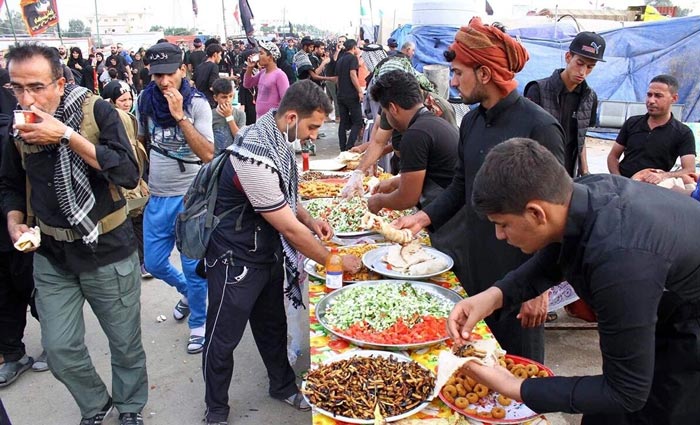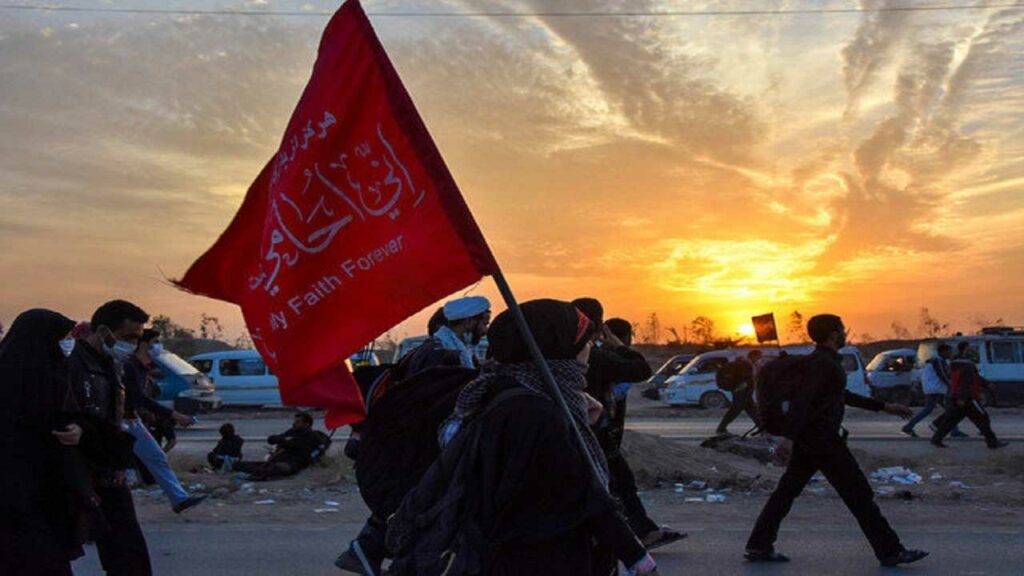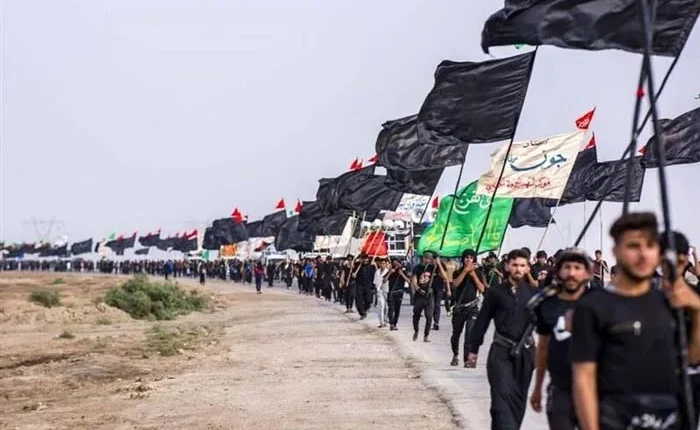Pilgrimage to Imam al-Hussain and the Arbaeen Walk 2024 Update
Contents
- 1 The Origin of the Arbaeen Pilgrimage
- 2 The First Pilgrim of Arbaeen
- 3 When Did the Arbaeen Walk Become Popular?
- 4 On the Way to Karbala
- 5 Preparing for the Walk as a Pilgrim
- 6 Significance of the Arbaeen Walk
- 7 The Pinnacle of Brotherhood in the Arbaeen Walk
- 8 The Love for Imam al-Hussain (a) During Arbaeen
- 9 Arbaeen as An Islamic Principle
- 10 The Ziyarah of Arbaeen
- 11 Conclusion
In recent years, walking a distance from Najaf to Karbala to commemorate Arbaeen, meaning the 40th day past the martyrdom of Imam al-Hussain (a), has become incredibly popular among Muslims and non-Muslims alike. What sparked people’s interest in this pilgrimage? How did it become a tradition and norm? Keep reading this article to find out.
The Origin of the Arbaeen Pilgrimage
One of the most important and authentic pieces of evidence regarding the Arbaeen pilgrimage is a narration from Imam Hassan al-Askari (a), in which his eminence states the signs of a believer:
عَلَامَاتُ الْمُؤْمِنِ خَمْسٌ صَلَاةُ الْإِحْدَى وَ الْخَمْسِینَ وَ زِیَارَةُ الْأَرْبَعِینَ وَ التَّخَتُّمُ بِالْیَمِینِ وَ تَعْفِیرُ الْجَبِینِ وَ الْجَهْرُ بِ بِسْمِ اللَّهِ الرَّحْمنِ الرَّحِیمِ.
A believer has five signs; fifty-one units of prayer each day, the ziyarah of Arbaeen, a ring on their right hand, the mark of prostration on their forehead, and saying Bismillah in an audible tone (during prayer).
In addition to the text of the ziyarah of Arbaeen, this narration is the only authentic source pointing to the Arbaeen of Imam al-Hussain (a) and its significance.
The First Pilgrim of Arbaeen
The very first pilgrim to go to Karbala on the 40th day after the martyrdom of Imam al-Hussain (a) was the great companion of Prophet Muhammad (s), Jabir ibn Abdullah al-Ansari. Jabir was one of those who lived during the time of the Prophet (s) and had a very long life. He even had the chance to be in the presence of the fifth Shia Imam, Imam Muhammad al-Baqir (a). Some say the family of Imam al-Hussain (a), who was taken captive, also arrived at Karbala on the 40th day of Imam al-Hussain’s martyrdom. Others have denied such a possibility because they believe they were held captive much longer than to go back to Karbala forty days after the Imam’s martyrdom. In any case, Jabir was the first person to visit Imam al-Hussain’s grave (a) on Arbaeen.
When Did the Arbaeen Walk Become Popular?
Iraqis and a few people from other nationalities would go on the Arbaeen walk before the coming to power of Saddam. When Saddam came to power, he banned traveling to the shrine of Imam al-Hussain (a) on foot on Arbaeen. After Saddam was ousted in 2003, this tradition was revived. Iraqi people from different cities surrounding Karbala once again began traveling to Karbala on foot on Arbaeen. Slowly within the next couple of years, this walk became so popular that people from many nationalities began coming to Iraq to participate in the Arbaeen walk. Now, tens of millions of people commemorate the 40th day after the martyrdom of Imam al-Hussain by walking from Najaf and the cities surrounding Karbala to the shrine of Imam al-Hussain (a).
On the Way to Karbala
On the way to Karbala from the cities surrounding it, one of the very noticeable things is the mawkibs (مَوکِب) that people set up. A mawkib is a stand where different services are offered to the pilgrims, such as food, drinks, lodging, medical services, and international phone calls. There are many mawkibs on the way to Karbala that people from different countries set up. By offering these services, they ease the journey of the pilgrims to Karbala and earn more rewards from Allah.
Different food is served, such as kebab, grilled chicken and fish, shawarma, falafel, and rice. Drinks such as tea, coffee, fruit juice, and lemonade are served in many mawkibs. This is the beauty of the Arbaeen walk. Everyone is doing their best to make Allah and Imam al-Hussain (a) happy by doing service to the pilgrims. If it were not for their pure intention, we would never see such mawkibs.

Preparing for the Walk as a Pilgrim
A lot of people want to know what they need to bring with themselves and how they should prepare themselves for the Arbaeen walk, especially if they are coming from countries that are very distant from Iraq. The key point is that they shouldn’t make their bags too heavy because it will cause a great deal of trouble for them if they wish to cover the entire distance between Najaf and Karbala on foot. A heavy bag will only spell trouble because walking a long distance with a heavy weight will prove more difficult than carrying a light-weight bag. Therefore, bringing a backpack that has some essential items such as pieces of clothing, a towel, toothbrush, a water bottle, and if you can a light travel blanket is more than enough.
Another major consideration you must take into account is your footwear. Wearing heavy, clumpy, too tight or too loose, and in general uncomfortable shoes will create many problems. The biggest of which are blisters and cramps. Make sure you do two things as far as footwear is concerned: (1) wear comfortable, light, fitted but not too tight shoes that you won’t feel too hot in them either. (2) Bring a pair of light and comfortable slippers so that you may wear them for some time on your journey. This is so that you give your feet some rest. If you do these two things, you will be safe from blisters.
Do I Need to Take Food With Me?
As far as food is concerned, you won’t need to take any with you because there will be many good things for you to eat on your way in the mawkibs that have been set up. The only thing you will need is a water bottle and if you are prone to headaches or muscle cramps, bringing some painkillers won’t be a bad idea. Moreover, if you’re taking pharmaceuticals due to a chronic disease such as diabetes, make sure you bring them with you.
What About Lodging?
Because a long distance is to be covered from Najaf to Karbala, it usually takes several days to reach the destination. Naturally, one has to stay at a place at night. Where, one may ask? Usually, there are places to rest in the mawkibs. That is why it is important to have a travel blanket with you as we mentioned.
Significance of the Arbaeen Walk
The Arbaeen walk is not merely a religious event. There are other dimensions to it. For example, it has many social, cultural, and political messages. It is a peaceful gathering where tens of millions of people unite to call out to the world their readiness to further the cause of Imam al-Hussain (a). The Arbaeen walk is a mark of friendship for all Muslims and non-Muslims who take part in this great event, regardless of age, nationality, ethnicity, race, gender, denomination, and religion. Some even go as far as to say that the Arbaeen walk has such an enormous significance that it is a prelude and preparation for the reappearance of Imam al-Mahdi (a). Perhaps other than hajj, there is no other religious gathering and pilgrimage equal to the caliber of the Arbaeen walk.
The Pinnacle of Brotherhood in the Arbaeen Walk
Undoubtedly, you would not find this level of brotherhood anywhere in the world other than in the Arba‘een walk. The people at the mawkibs do everything they can for the pilgrims. They give them food and drinks, provide lodging for them if it is nighttime, and offer them many other services. You could even say that they would not do such good things to their biological brothers and sisters. All along the journey, the walkers feel joyous and comfortable thanks to the services that people offer them.
The Arba‘een walk conveys a powerful message to the Muslim world and the whole world. They should see the extent of brotherhood among the Muslims and even non-Muslims who participate in the Arba‘een walk. Everyone is friendly toward one another, whether the participants or those who conduct the mawkibs. You would rarely see a fight between people in the Arba‘een walk.
The Love for Imam al-Hussain (a) During Arbaeen
One may wonder how this brotherhood came into being. Did it happen randomly or accidentally, or does it have a specific cause? The answer is clear. This brotherhood came into being due to people’s love for Imam al-Hussain (a). The visitors of Imam al-Hussain’s (a) shrine are to be respected and honored. All the people who receive the pilgrims of Arba‘een believe in this sincerely. That is why they do not disrespect them or upset them in the least. As a result, the love for Imam al-Hussain (a) is so deep that it can unite everyone regardless of age, gender, religion, and race.

Arbaeen as An Islamic Principle
Allah emphasizes the issue of brotherhood among Muslims to the utmost degree. Allah says in the Quran:
إِنَّمَا ٱلْمُؤْمِنُونَ إِخْوَةٌ فَأَصْلِحُوا۟ بَيْنَ أَخَوَيْكُمْ ۚ وَٱتَّقُوا۟ ٱللَّهَ لَعَلَّكُمْ تُرْحَمُونَ
The faithful are indeed brothers. Therefore, make peace between your brothers and be wary of Allah so that you may receive [His] mercy. (Quran 49:10, Translation by Qara’i)
We must always treat our fellow Muslims as brothers and sisters. The Arba‘een walk simply manifests this brotherhood to the highest degree. Therefore, it should not be the case that we treat each other like brothers and sisters only during Arba‘een. We should maintain this brotherhood all the time and throughout our lives.
What the Prophet (s) Has Said About Brotherhood
Prophet Muhammad (s) always emphasized the importance of Muslims being brothers. He himself swore an oath of brotherhood (‘aqd al-ukhuwwah) with Imam Ali and thus they became blood brothers. This does not mean that he considered Imam Ali as his only brother. He had said that all Muslims are brothers:
المُسْلِمُ أخو المْسلِمِ لا يَظْلِمُهُ ولا يخْذِلُهُ ولا يُسَلِّمُهُ.
“A Muslim is the brother of other Muslims. He never oppresses them, abandons them, and never leaves them alone in the face of calamities.”[1]
The Ziyarah of Arbaeen
A special ziyarah has been transmitted to us from our Imams (a) to be read on the 40th day after the martyrdom of Imam al-Hussain (a). It is known as the Ziyrah of Arbaeen. It is a very short ziyarah compared to the other ziyarahs of Imam al-Hussain (a). Those who go on the Arbaeen walk read this ziyarah on the 20th of Safar, which marks the 40th day after the martyrdom of Imam al-Hussain (a). There is a narration from Imam Hassan al-Askari that reading this ziyarah is one of the signs of a believer (mu’min).
Conclusion
The Arbaeen walk is a major event held each year, commemorating the 40th day after the martyrdom of Imam al-Hussain (a). People walk from the cities surrounding Karbala, such as Najaf, to visit the shrine of Imam al-Hussain (a). Tens of millions of people from different countries visit Iraq to participate in the Arbaeen walk. The Arbaeen walk is a very important event that carries the message of peace, unity, and friendship among all people in the world. May Allah grant us the privilege to participate in the Arbaeen walk in the near future. Amen.


Thanks for all the effort put to guid our children to the right path.
i wrote your text and it was very good. Thanks for your effort . i’m from Iran .